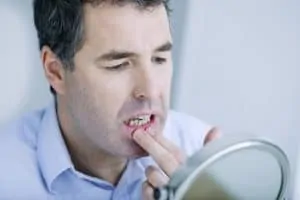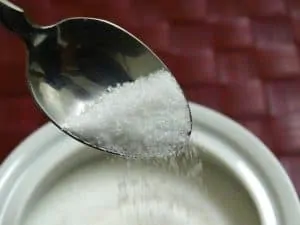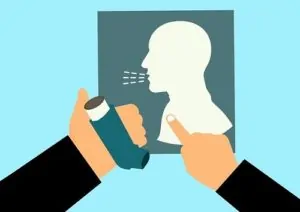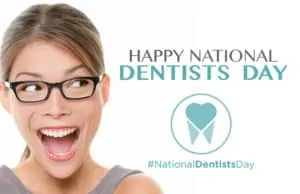General Dentistry

Gum Disease
One of the most common signs of gum disease is painful, swollen, red gums. You may experience increased pain when brushing or flossing your teeth, and you may also notice that your gums bleed during those activities. Gum disease is a serious oral health condition that doesn’t happen suddenly but rather over time and often due to poor oral hygiene. If left untreated, gum disease can lead a whole host of both oral and overall health concerns such as tooth loss, heart disease, kidney disease, and even some cancers. However, if caught early, gum disease can be treated successfully. This is one reason why seeing your dentist in Sparks every six months is so important.
Oral Cancer
Another possible explanation for gum pain can be oral cancer. Even though oral cancer can affect the tongue, cheeks, throat, or the gums, it’s important to talk with your dentist in Sparks about any changes in your mouth, especially if they cause pain or are accompanied by a sore that doesn’t go away. Oral cancer usually presents itself as a sore, but it doesn’t necessarily have to feel sore, too, so make sure to monitor any abnormalities and report to your dentist sooner rather than later if they don’t go away. Oral cancer can be treated successfully, but the earlier it’s caught, the more successful treatment tends to be.
Canker Sores
Speaking of sores in the mouth, canker sores are incredibly common and usually no cause for concern. However, they can cause gum pain. There’s no magic treatment to making a canker sore go away, and they will usually disappear on their own. But again, if what started out as what you thought was only a canker sore doesn’t get better on its own, a visit to a dentist in Sparks should be the next step.
Hormones
Now, this explanation behind gum pain only applies to women, but it’s certainly worth mentioning. During different times in a woman’s life, she goes through hormonal changes, especially during menstruation or pregnancy. One area that can be affected by these shifts in hormone level is the gums. It’s common for women to experience swollen or bleeding gums during both pregnancy and a few days before their periods. The pain is usually temporary but you should still discuss it with your dentist.
If you’re experiencing any gum pain, it’s important to call and schedule an appointment with your dentist in Sparks. The pain may be minor and nothing that requires treatment, however, it’s better to get it checked out so that any potential problems are caught early and treatment can begin before the problem gets bigger.

How to Differentiate Between a Headache and Migraine
Oftentimes, the terms headache and migraine are used interchangeably. However, they are technically two separate conditions and present themselves with similar, yet different, symptoms. Both conditions involve pain in the head and it can either be a throbbing or dull pain in both. But there are a few differences in other symptoms that can help identify whether you have a headache or a migraine.
Headache Symptoms
- Pain is usually spread throughout the head
- Pain remains consistent and doesn’t tend to worsen with activity
- Usually has the feeling of constant pressure
- Symptoms are localized to only the head
Migraine Symptoms
- Pain usually affects one side of the head more than the other, but not always
- Sensitivity to light and noise
- Blurry vision
- Nausea
- Aura symptoms such as blind spots, zig-zag lines, or shimmery, glowy patches
Are Migraines and Headaches Related to Dentistry?
We know that it may seem odd to have your dentist in Sparks talk about conditions that seemingly only affect the head, but the truth is, there may be a connection between chronic headaches and migraines and dentistry. After all, the head is connected to the neck which is connected to the jaw, and there are muscle groups connected to each, so it’s certainly worth a closer look.
Numerous studies have shown a potential correlation between a poor bite as well as habitually grinding or clenching teeth and an increased risk of chronic headaches or migraines. When someone has a poor bite or constantly grinds their teeth together, the muscles in the jaw joint are under constant and abnormal pressure and may cause a painful condition known as TMD (or TMJ). But the pain may not end at the jaw joint alone. As we’ve mentioned earlier, the head, neck, and jaw are all connected through a complex system of muscles, so when pain affects one section, it can also spread to affect other areas, such as the head. The theory researchers are studying regularly is that this constant muscular pressure may just cause certain headaches or migraines.
We always encourage migraine and headache sufferers to talk with their primary care physician, as well as their dentist in Sparks, to see if their pain may be caused, or a least exacerbated by, something related to their oral health. Additionally, there is no concrete cause of migraines or headaches, so intervention from your medical team is necessary to diagnose just what may be causing your individual migraines or headaches in order to determine how to treat them effectively.

Xylitol: 101
While xylitol is yet another sugar substitute, it’s actually quite different from many others available at your local grocery store. First of all, xylitol is natural — it’s found in fruits, veggies, and even in our bodies during digestion. Second, xylitol tastes like sugar but doesn’t act like sugar once it’s in our bodies. This means you can still have a sweet treat without all of the negative side effects of actual sugar. You see, sugar is pretty harmful to our overall health. It can spike blood glucose levels and, over time, cause difficulties with your metabolism. This may result in weight gain or make it difficult to lose weight. Xylitol, on the other hand, is low in calories (it has 40% fewer calories than sugar!) and has a low glycemic index. As a result, blood glucose levels are nearly unaffected by xylitol, and bodies are protected. But that’s not all. As your dentist in Sparks knows, xylitol may protect oral health, too.
The Protective Power of Xylitol
We already know that xylitol is a healthier alternative to sugar and can protect our bodies. But the oral benefits of xylitol are also plentiful. Chewing gum that contains xylitol may:
- Prevent tooth decay
- Starve bacteria
- Prevent oral inflammation
- Reduce your risk of gum disease
- Remineralize teeth
- Increase saliva production
- Reduce the acidity of your saliva
- Help with calcium absorption
How does xylitol do all of that? We’re glad you asked.
Essentially, xylitol starves a dangerous bacteria commonly found in our mouths called Streptococcus mutans. These bacteria love to feed on sugar as it gives them fuel and allows them to multiply, which is a big problem. Streptococcus mutans is the main cause of plaque buildup, and when there are too many Streptococcus mutans, there’s probably also too much plaque. The result? An increased likelihood of developing cavities. But when we replace sugar with xylitol, we see a much different result. Streptococcus mutans bacteria will still feed on the xylitol, but instead of fueling the bacteria, xylitol actually starves them and they start to die. This means fewer bacteria and a lower risk of decay.
Even though chewing xylitol gum can go a long way in protecting teeth, it is not a replacement for good old-fashioned oral hygiene. Yes, gum can freshen breath, and yes, xylitol can help prevent decay, but if you don’t brush and you don’t floss, and if you don’t see your dentist in Sparks regularly, chances are xylitol won’t be enough to protect your teeth.

What’s Dentistry Got To Do With It?
Asthma affects 1 in every 13 Americans, or close to 25 million people just in our part of the world. This life-long condition affects the respiratory system and can cause shortness of breath, wheezing, coughing, and chest tightness. It’s a very serious condition that can be treated, but if it’s not treated properly or quickly enough, it can lead to death. So how exactly does this relate to dentistry?
- Mouth Breathing
People with asthma tend to have a hard time breathing and feel as if they can’t get enough oxygen with each breath. Because of this, many asthma patients will breathe out of their mouths instead of their noses, since they can get more air into the lungs this way. However, your dentist in Sparks wants you to know that mouth breathing doesn’t come without risks. Mouth breathing can reduce saliva amounts, as well as the body’s ability to produce more saliva, resulting in dry mouth. Dry mouth is an oral health condition that may seem like only a minor, uncomfortable nuisance, but the truth is dry mouth can increase the risk of decay, cavities, bad breath, and gum disease. Usually, saliva will rinse away bacteria and neutralize acids in the mouth, protecting teeth against their damaging effects. However, when a mouth is too dry to do this, bacteria and acids can attack teeth, resulting in decay. Additionally, when bacteria are left to linger around, it can lead to bad breath.
- Asthma Treatments
Similar to mouth breathing, many asthma treatments, such as inhalers, also cause dry mouth. As we know, a dry mouth is a perfect environment for bacteria and acids to cause damage. If patients do notice a dry mouth after taking their medication, they should talk with their doctor and dentist in Sparks to find ways to relieve dry mouth. Never stop taking a medication without first consulting with your physician.
What You Can Do
There is some good news for asthma patients who are dealing with dry mouth as a result of either medication or mouth breathing. There are things you can do decrease your risk of oral health problems such as:
- Staying Hydrated. Water is one of the most important things for everyone, whether they’re an asthma patient or not. Drinking enough water throughout the day helps keep the mouth moist and helps to wash away bacteria and food particles as well as neutralize damaging acids.
- Rinsing With Water. A quick rinse of water after taking asthma medication will help get rid of any ingredients that contribute to dry mouth so they aren’t left lingering around all day. The more remnants of medication you can remove, the lower the chance of dry mouth.
- Talking to Your Dentist. Your dentist is a part of your healthcare team and needs to know about any health conditions you have, including asthma. Knowing your health history helps your dental team customize treatment for you and notifies them to be on the lookout for any oral health concerns that may result from other health problems in the rest of the body.
As always, the best ways to protect oral health against decay, bad breath, and gum disease are to brush and floss every day and to see your dentist in Sparks every six months for checkups and professional cleanings, whether you’re an asthma patient or not.

- Don’t Chew on Anything That’s Not Food. Our teeth are meant to help us chew and digest our food. But that doesn’t mean we should chew on non-food items. Nibbling on pen caps, pencils, fingernails, or other foreign objects can increase your risk of chipping or cracking a tooth, breaking a tooth, or injuring the soft tissues in your mouth. If it’s not food, keep it out of your mouth.
- Be Careful With the Food You Chew. So, even though we talked about how your teeth are specifically designed to help us chew our food, some foods can also increase the risk of tooth damage. Be careful when snacking on popcorn, hard fruits or vegetables, and even nuts. These foods are tough to chew, and if you catch a popcorn kernel or bite into a tough nut when you’re not expecting it, you can easily crack or chip a tooth or dental restoration. Lastly, avoid crunching on ice cubes. These frozen blocks are notorious for creating chips, cracks, and fractures in teeth.
- Choose Water. Water is the best beverage to both hydrate our bodies and to keep our oral health in tip-top shape. Other beverages such as soft drinks, fruit juices, and sports drinks may seem refreshing, but they are packed with sugar and acid. These two ingredients are a particularly bad combination for your teeth as they can both contribute to decay and weakened enamel.
- Avoid Tobacco. All forms of tobacco, including cigarettes, cigars, and chewing tobacco damage teeth and can not only increase the likelihood of experiencing a dental emergency, but they can also cause long-term, serious complications to both your oral health and overall health. Tobacco users tend to be at greater risk of oral cancer, gum disease, and even tooth loss.
- Limit Your Snack Times. Snacking can be good for you, but constantly snacking can be dangerous to your oral health. When we snack multiple times throughout the day, we’re continuously introducing food particles into our mouths. Why is this concerning to your dentist in Sparks? Well, more food particles in your mouth mean more bacteria. And a constant stream of foodstuffs regularly fuels the bacteria and keeps them active. As a result, the bacteria are constantly releasing an acidic byproduct, increasing your risk of decay and cavities.
Following the tips above won’t guarantee the prevention of a dental emergency, but they can help lower the risk and keep your mouth healthy. Of course, making sure to follow a strict oral hygiene routine at home is also important to protect your smile. Brushing twice a day, floss once a day, and see your dentist in Sparks regularly.*
If you think you may have a dental emergency, call your dentist to determine the best course of action for your specific needs.
*At the time of publishing, the ADA has recommended the postponement of all preventive dental appointments. Please check your local recommendations.

Up First: The Dos
We like leading with the positive so let’s first focus on what you should do to protect your teeth during your at-home oral hygiene routine.
- Brush & Floss – The benefits of regularly brushing and flossing your teeth are undeniable, and you should continue to brush your teeth twice a day and floss once a day (even if you’re not leaving the house). Cleaning your teeth and removing debris from between them goes a long way in keeping your breath fresh and eliminating bacteria.
- Replace Your Toothbrush – Your toothbrush needs to be in good condition to do its job effectively. For this reason, your dentist in Sparks recommends replacing your toothbrush at least every 3-4 months or as soon as you notice the bristles starting to fray. You should also get a new toothbrush if you get sick.
- Store Your Toothbrush Correctly – Believe it or not, there is a right way to store your toothbrush — upright and uncovered.
- Wash Your Hands – This advice is everywhere today and one that we wholeheartedly agree with. Washing your hands several times a day helps reduce the risk of getting sick. You should also wash your hands prior to brushing your teeth or flossing.
- Disinfect Your Toothbrush – A recent study found that 0.5% hydrogen peroxide effectively reduces coronavirus infectivity. To make this solution:
- Mix 1 fl oz of 3% hydrogen peroxide with 5 fl oz of water
- Soak your toothbrush in the mixture for 10 minutes. Dump out the mixture.
- Rinse your toothbrush prior to brushing.
Now: The Don’ts
Just like there are things you should do to protect your oral health, there are also things that you should avoid if at all possible.
- Don’t Share Your Toothbrush – Your toothbrush is yours and yours alone. Don’t share it with anyone, including other family members. Doing so can easily transfer bodily fluids from you to them or from them to you.
- Don’t Allow Family Brushes to Touch – Similarly to the above, you shouldn’t allow family members’ toothbrushes to touch while being stored. Make sure they’re kept a few inches away from each other.
- Don’t Bite Your Nails – Millions of Americans bite their nails, but now may be a good time to work on breaking that habit. Not only does nail biting easily spread bacteria from whatever may be lurking under our fingernails to our mouths, but it can also damage teeth.
As of the publishing date, the American Dental Association (ADA) has recommended the postponement of any preventive or routine dental care for three weeks. During this time, your dentist in Sparks wants to encourage you to do everything you can to take care of your smile, including following the tips above. Stay healthy, and we hope to see you soon.

Isn’t Brushing & Flossing Enough?
Even if you practice a great oral hygiene routine in the comfort of your home by brushing twice a day and flossing once a day, you may not be fully protecting yourself against some of the dangers lurking in our mouths. Professional dental cleanings and comprehensive checkups can catch potential problems early and do wonders in keeping both your mouth and your body healthy.
Dental X-Rays
One of the things you’ll usually experience at one of your bi-annual dental visits is having x-rays taken. These often digital photos allow your dentist in Sparks to take a peek under the surface of your teeth and gums to get a full picture of what’s going on in your mouth. Images created from x-rays can allow your dental team to catch any decay that may not yet be visible to the naked eye. When decay is caught early, it’s treated easily and protects you against the need for advanced dental treatment such as root canals or even tooth loss. X-rays can even help diagnose an abscess (infection). If not treated, a dental abscess can affect overall health and lead to:
- Tooth loss
- Sinus infection
- Bacterial endocarditis (when the infection makes its way to the heart)
- Infection in the face and jaw which can restrict the airway (Ludwig’s angina)
Oral & Overall Health
As we’ve mentioned before, there is a strong connection between oral health and overall health. For example, gum disease can potentially be a serious infection that can easily contribute to health problems outside of the mouth. If not treated promptly and it’s allowed to progress, gum disease puts patients at an increased risk of heart disease, respiratory disease, and diabetes.
But that’s not all. Many whole-body diseases may first show signs in the mouth including diabetes, kidney disease, certain cancers, and heart disease. The sooner these health concerns are diagnosed, the more successful treatment tends to be. This is one reason you should see your dentist in Sparks every six months.
Your dentist will usually recommend that you schedule and complete an appointment twice a year. However, if you’re at higher risk for some of the problems listed above you may be asked to be seen more often. These preventive appointments can go a long way in not only protecting your smile and oral health but your overall, whole-body health as well.
If you’ve been putting off your dental checkup and cleaning, call to schedule an appointment today.

Simplifying Nutrition
The truth is, eating right doesn’t sound too difficult. But fully understanding nutrition and those crazy nutrition labels can be confusing. The basics are, well, basic — don’t eat too much sugar, avoid indulging in fast food, eat more vegetables, etc. However, truly fueling your body with what it needs to perform at its best is complicated. In fact, even the Food Guide Pyramid from the United States Department of Agriculture (USDA) has changed twice since it was created in 1992. And the current MyPlate dietary guidelines are individualized based on age, gender, height, weight, and daily activity level. Essentially, what’s right for one person may not be right for another. No wonder we’re all confused! The best way to find out the best dietary recommendations for you is to check out the MyPlate checklist to find your ideal combination of:
- Fruits
- Vegetables
- Whole Grains
- Lean Proteins
- Dairy
Nutrition & Oral Health
We know that eating a healthy, well-balanced diet can certainly benefit our bodies and help keep us healthy. The same is true for your oral health. Sugary foods, carbs, and acidic foods and drinks can definitely put teeth at risk for decreased enamel protection and, as a result, more susceptible to decay and cavities. Try your best to avoid those foods in high quantities. Instead, choose some of the best foods for your smile (and your body) including:
- Cheese
- Fatty Fish
- Eggs
- Raw Veggies – especially the crunchy ones!
- Water
More on Sugar
It’s no secret that your dentist in Sparks really, really doesn’t like sugar. This is because sugar is one of the top contributors to decay. When we eat sugary foods, the bacteria in our mouths feed on the sugar and release an acidic byproduct. This acid attacks tooth enamel, weakening it, which makes it easier for bacteria to find its way into teeth’s tiny nooks and crannies. The result? Decay, cavities, and the need for dental treatment such as fillings or even a root canal. Reduced tooth enamel can also make teeth very sensitive to hot or cold or change the color from bright white to a dull, darker appearance.
However, sweet treats aren’t the only snacks that are packed with sugars. In fact, there are foods out there that don’t even taste sweet but have the same effect. Carbohydrates have something called the hidden sugar effect. As we eat them, carbs break down into simple sugars, and we know what happens in our mouth when we give the bacteria sugar. So even if you don’t have a traditional sweet tooth, check out the nutrition labels and try to limit not only foods with high sugar content but also those with a lot of carbs.
Choosing healthier meals and snacks for you and your family can help you all live a healthy life. Eating foods that are good for your body can also protect your teeth from the damaging effects of sugar and acid. Try to pick foods that are good for you overall. Your body, your smile, your dentist in Sparks will thank you for it.
Re-posted with the permission of Perio Protect.

First of all, dentistry has resulted in a higher quality of life—and longer lives—for people all over the world. For most of human history, people suffered from oral diseases and really had no way of treating them. Today, not only do you not have to worry much about serious oral diseases, but the ones that do occur can be treated quite comfortably. And then there’s the added benefits of a bright, white smile, healthy teeth and gums, as well as fresh breath—all thanks to dentists who are just an appointment away.
As a certified Perio Protect provider, those benefits are even closer for our patients. Perio Protect is a non-invasive periodontal disease treatment. It’s a simple, convenient way to treat gum infections (that 80% of American adults have!) comfortably in your own home, and on your schedule.
The FDA-cleared Perio Trays® are custom-molded to fit comfortably over your teeth and gums while delivering antimicrobial medication deep below the gum line. It’s great for treating and preventing gum disease.
We love to share good news with our patients about treatment that prevents disease or addresses it in its earliest stages. Contact us if you have concerns about bleeding or inflamed gums. Or even just to wish us a happy National Dentists Day.

The Fascinating Tongue
Our tongues may not seem that fascinating, but to your dentist in Sparks, these muscles are actually quite interesting and important. Not only are our tongues one of the strongest muscles in our bodies, but they also help us do many useful, everyday tasks such as speak, chew, and swallow. Tongues also have about 10,000 taste buds that allow us to taste every bit of our favorite foods. But these taste buds are also really great places for bacteria to hide. If those bacteria are not removed regularly, they can start to negatively affect oral health.
What Happens if You Don’t Brush Your Tongue?
Our tongues are made up of tons of tiny bumps called papillae. These papillae create peaks and valleys on our tongues and give bacteria the perfect place to settle. If the bacteria aren’t removed, you may experience some unwanted side effects. Let’s take a look at a few.
- Bad Breath – One of the most common side effects of not brushing your tongue is bad breath. While bad breath can be caused by a lot of different things, an unclean tongue can be to blame.
- Decreased Sense of Taste – Everyone loves to eat their favorite foods because they taste good. But when a tongue is not properly cared for, bacteria can coat our taste buds and decrease our sense of taste. This means that our favorite foods may not taste quite as good as they once did.
- Black, Hairy Tongue – Even though this sounds scary and gross, black, hairy tongue is a very real thing that can occur from not brushing your tongue. This discoloration happens when food and drink particles aren’t removed from the surface of the tongue and essentially stain those tiny papillae. It should go away on its own once you get into the tongue-brushing habit.
- Gum Disease – Since our tongues are in contact with our teeth throughout the day, everything on our tongues can easily transfer onto our teeth. When tongue bacteria move to the teeth, it can cause decay and, if left untreated, progress into gum disease. Gum disease is a serious oral health condition that can cause tooth loss if not treated.
How Do You Clean Your Tongue?
It’s important to brush your tongue every time you brush your teeth. This will give you the cleanest mouth. You don’t need to scrub your tongue hard, and truth be told you shouldn’t. A gentle brushing from the back of the tongue to the front and from side-to-side will do just fine. However, patients with a strong gag reflex may have trouble with this method. If this is the case, try using a tongue scraper that you can buy at any pharmacy. It’s just as effective as brushing but may not trigger the gag reflex as much as a toothbrush.
Brushing your tongue is a crucial step in making sure you’re caring for your overall oral health as well as possible. Of course, seeing your dentist in Sparks at least every six months is also necessary.
